The Strategic Advantage of Advanced Hot Wedge Welding Technology
In critical infrastructure projects, environmental protection, and industrial applications, the integrity of geomembrane installations is paramount. This demands highly reliable and efficient welding solutions. The market for a wedge welder for sale is driven by the increasing global emphasis on robust, leak-proof containment systems for landfills, mining operations, water reservoirs, and civil engineering projects. A hot wedge welder, renowned for its consistent heat application and precision, stands as the industry standard for joining thermoplastic materials. This article delves into the technical intricacies, application benefits, and strategic considerations for acquiring these essential machines, focusing on the SWT-NS900D Hot Wedge Machine as a prime example of advanced engineering.
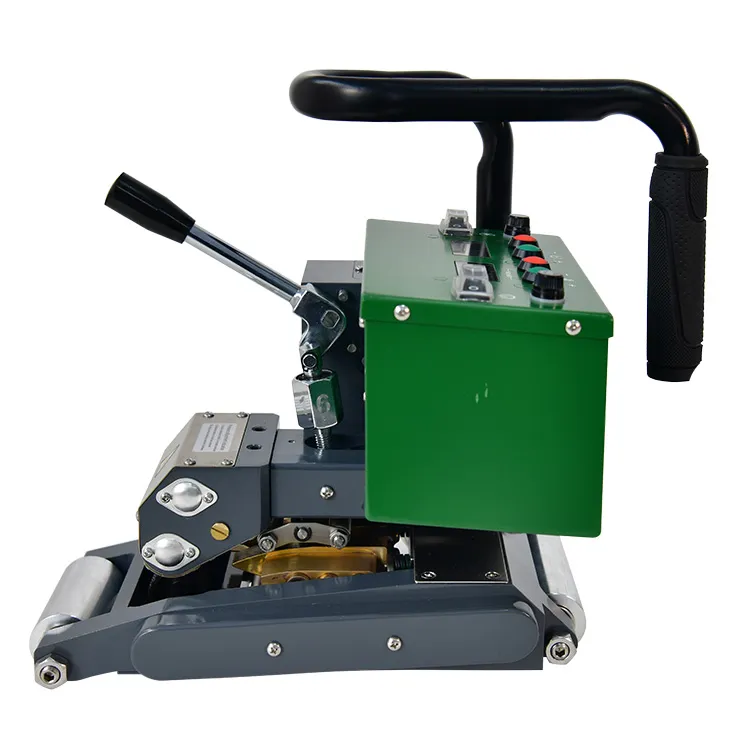
The demand for these specialized machines is not merely transactional; it reflects a strategic investment in long-term operational integrity and environmental compliance. Understanding the manufacturing process, technical specifications, and real-world applications is crucial for B2B decision-makers seeking optimal return on investment.
Industry Trends and Market Dynamics for Wedge Welders
The global geomembrane market, projected to reach over USD 4.5 billion by 2028, is a significant driver for the wedge welder for sale segment. Key trends include:
- Sustainability Focus: Increased adoption of geomembranes in environmental containment, necessitating precise and durable welding for waste management (landfills), water conservation (reservoirs), and pollution control.
- Technological Advancements: Integration of digital controls, GPS tracking for weld mapping, and enhanced diagnostic features to improve weld quality and project traceability. Modern hot wedge welder units offer automated speed and temperature regulation.
- Material Diversification: Growth in the use of various thermoplastic materials such as HDPE, LDPE, LLDPE, PVC, and TPO, each requiring specific welding parameters that advanced wedge welder machines can precisely handle.
- Infrastructure Development: Massive global infrastructure projects, particularly in developing economies, driving demand for geomembranes in road construction, tunneling, and water management.
- Portability and Ergonomics: A growing preference for lightweight, robust, and user-friendly wedge welding equipment that can perform reliably in diverse and often challenging field conditions.
These trends underscore the importance of selecting a wedge welder that not only meets current project demands but also offers the versatility and technological sophistication to adapt to future industry challenges.
The Manufacturing Process of a High-Performance Wedge Welder
The creation of a reliable wedge welder for sale is a multi-stage process, meticulously engineered to ensure precision, durability, and consistent performance in demanding environments. Adherence to international standards such as ISO 9001 for quality management and ANSI standards for electrical safety and mechanical integrity is critical throughout.
1. Material Selection and Sourcing:
- Chassis and Frame: High-grade aluminum alloys or stainless steel are chosen for their optimal strength-to-weight ratio and corrosion resistance, crucial for fieldwork.
- Hot Wedge Element: Specialized copper alloys or high-temperature resistant stainless steel are used for the wedge itself, ensuring rapid heat transfer, thermal stability, and prolonged service life. Ceramic insulation is often employed to maintain heat efficiency.
- Rollers: Durable, heat-resistant silicone or steel compression rollers, designed for consistent pressure application without damaging geomembrane surfaces.
- Electronic Components: Industrial-grade microcontrollers, heating elements, and motor drives selected for precision control, reliability, and robust performance in varying voltage conditions.
2. Precision Manufacturing Processes:
- CNC Machining: Core components like the hot wedge, motor mounts, and frame parts undergo precision CNC machining to achieve tight tolerances and perfect fitment, crucial for consistent weld quality.
- Heat Treatment: Critical parts, especially the wedge, may undergo specialized heat treatments (e.g., annealing, tempering) to enhance hardness, wear resistance, and overall longevity.
- Surface Finishing: Components are often treated with anodizing or powder coating for enhanced corrosion resistance and a professional finish, ensuring durability in harsh operating environments.
3. Assembly and Quality Control:
- Modular Assembly: Components are assembled in a modular fashion, allowing for easier maintenance and part replacement, contributing to an extended service life.
-
Rigorous Testing:
- Functional Testing: Each hot wedge welder undergoes extensive functional tests, verifying motor speed accuracy, heating element efficiency, and temperature control precision across its full operational range.
- Electrical Safety: Compliance with international electrical safety standards (e.g., CE, UL, RoHS) is confirmed through insulation resistance tests, ground continuity checks, and high-voltage breakdown tests.
- Weld Performance Test: Real-world welding tests on various geomembrane types ensure the machine consistently produces strong, uniform, and verifiable welds, meeting or exceeding industry pull-strength requirements.
This stringent manufacturing and testing protocol ensures that every wedge welder for sale delivers superior performance, energy efficiency, and exceptional corrosion resistance, providing a long service life of typically 5-10 years with proper maintenance, significantly reducing operational costs for target industries such as petrochemical, metallurgy, and water supply & drainage.
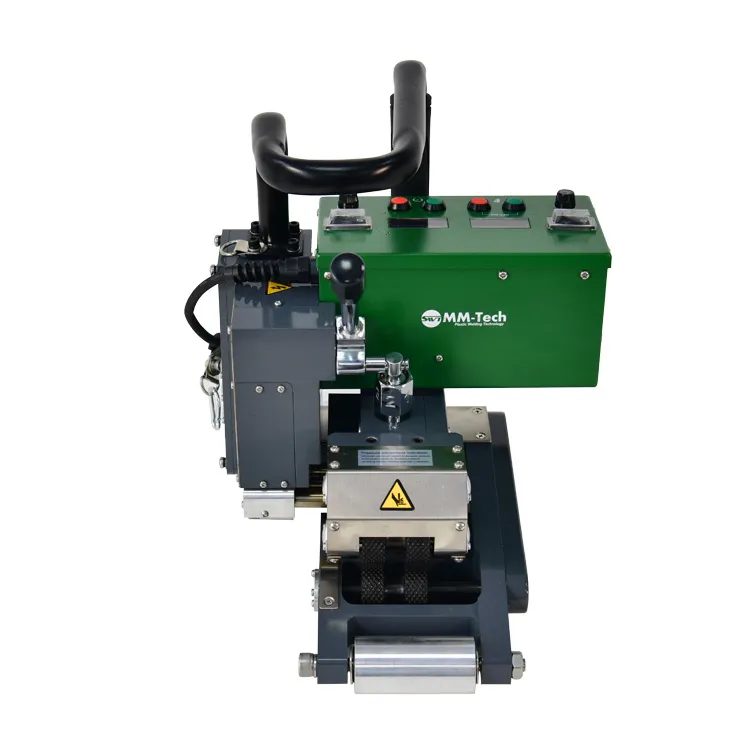
Technical Specifications: SWT-NS900D Hot Wedge Machine
The SWT-NS900D Hot Wedge Machine exemplifies cutting-edge hot wedge welder technology, engineered for high-volume, critical welding applications. Its robust design and precise control mechanisms ensure optimal weld quality across a wide range of thermoplastic geomembranes.
SWT-NS900D Product Specifications
| Parameter | Specification |
|---|---|
| Model | SWT-NS900D Hot Wedge Machine |
| Input Voltage | 220V AC, 50Hz |
| Motor Power | 900W |
| Heating Power | 1800W |
| Welding Speed | 0.5 – 5 m/min (Adjustable) |
| Welding Temperature | 0 – 450°C (Adjustable, PID Control) |
| Wedge Material | High-grade Copper Alloy |
| Seam Width | 12.5 mm x 2 (double weld with 12 mm test channel) |
| Weldable Thickness | 0.2 mm – 3.0 mm (HDPE, LDPE, LLDPE, PVC, EVA, PP) |
| Pressure Roller Width | 60 mm |
| Overall Dimensions | 420 mm × 300 mm × 300 mm |
| Machine Weight | Approx. 13 kg |
| Display | Digital LCD (Temperature, Speed) |
| Safety Features | Overheat protection, Motor overload protection |
The SWT-NS900D’s precise digital controls for temperature (PID control system ensures consistent heat, preventing material degradation) and speed (stepless adjustment for optimized welding on different materials and thicknesses) are key to its superior performance. The integrated pressure regulation system guarantees uniform compression, which is vital for creating strong, homogeneous welds.
Versatile Application Scenarios for Hot Wedge Welders
The adaptability of a hot wedge welder makes it indispensable across numerous industries, primarily wherever large-scale geomembrane installation is required.
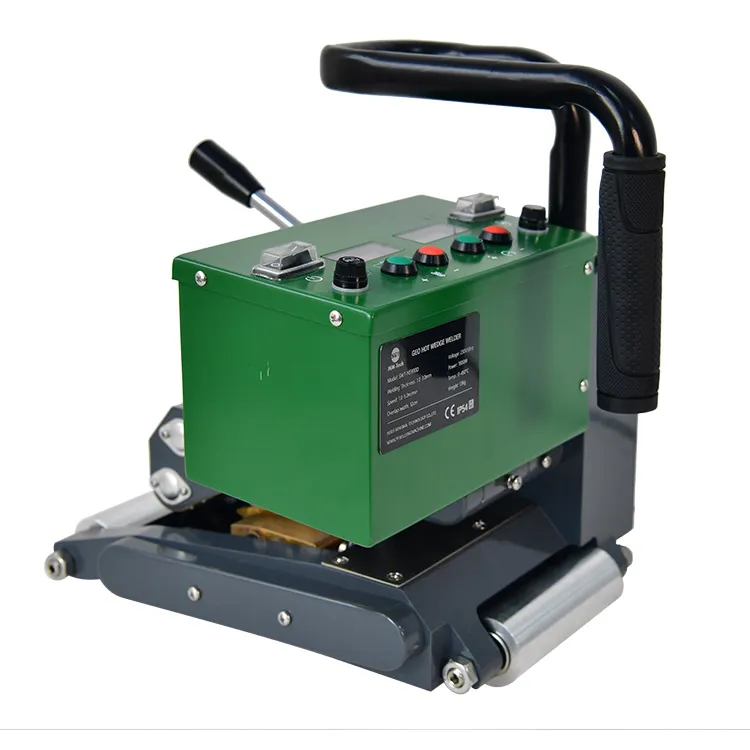
Key Application Areas:
- Environmental Protection (Landfills & Waste Management): Critical for welding geomembranes to line landfill cells, preventing leachate contamination of groundwater. The double weld with a test channel ensures verifiable, leak-proof containment.
- Water Conservancy (Reservoirs & Pond Liner Welding): Essential for creating impermeable barriers in water storage facilities, irrigation canals, and artificial ponds. A reliable pond liner welder ensures long-term water retention and prevents seepage losses.
- Mining Industry: Used for heap leach pads and tailing dams to contain process solutions and prevent environmental contamination. The ability to weld thick materials (up to 3.0mm) is crucial here.
- Civil Engineering (Tunnels & Foundations): Geomembranes provide waterproofing layers in tunnels, basements, and bridge decks. The consistent seam quality of a wedge welder ensures structural longevity.
- Aquaculture: Lining fish farms and shrimp ponds to maintain water quality and prevent escape of aquatic life, requiring durable and non-toxic welds.
- Energy Sector (Oil & Gas): Lining secondary containment areas around fuel storage tanks and drilling sites to prevent spills and soil contamination. The corrosion resistance of the machine is beneficial in these chemical-heavy environments.
In these diverse applications, the advantages of energy saving, efficient production, and superior corrosion resistance of advanced wedge welders like the SWT-NS900D translate directly into lower operational costs and enhanced project reliability.
Technical Advantages of Hot Wedge Welding Technology
The fundamental principle of hot wedge welding—direct heating and simultaneous pressure application—confers several distinct advantages over alternative methods like hot air welding or extrusion welding, making it the preferred choice for critical geomembrane projects.
- High Productivity & Speed: Hot wedge welders operate at significantly higher speeds (up to 5 m/min for the SWT-NS900D) compared to other methods, drastically reducing project timelines and labor costs for large-area welding.
- Superior Weld Quality & Integrity: The simultaneous application of heat and pressure ensures a homogeneous, molecular bond between geomembrane layers. This results in a weld that is often stronger than the parent material itself, crucial for load-bearing or containment applications. The double weld with an air test channel allows for non-destructive quality assurance testing.
- Consistent Heat Distribution: The metal wedge provides uniform heat transfer across the entire weld width, minimizing cold spots and overheating, which are common issues in other welding techniques. PID (Proportional-Integral-Derivative) control systems further optimize temperature stability.
- Versatility Across Materials: A well-engineered wedge welder can effectively weld a broad spectrum of thermoplastic materials, including HDPE, LDPE, LLDPE, PVC, EVA, and PP, by simply adjusting temperature and speed parameters.
- Reduced Environmental Impact: Unlike extrusion welding, hot wedge welding does not introduce additional material (filler rod), resulting in a cleaner process with less waste and no fumes from melting filler material.
- Enhanced Durability & Longevity: Welds created by this method are highly resistant to chemical attack, UV degradation, and mechanical stresses, contributing to the extended service life of geomembrane installations.
These advantages collectively position the hot wedge welder as a cornerstone technology for reliable geomembrane fabrication, offering unmatched efficiency and structural integrity.
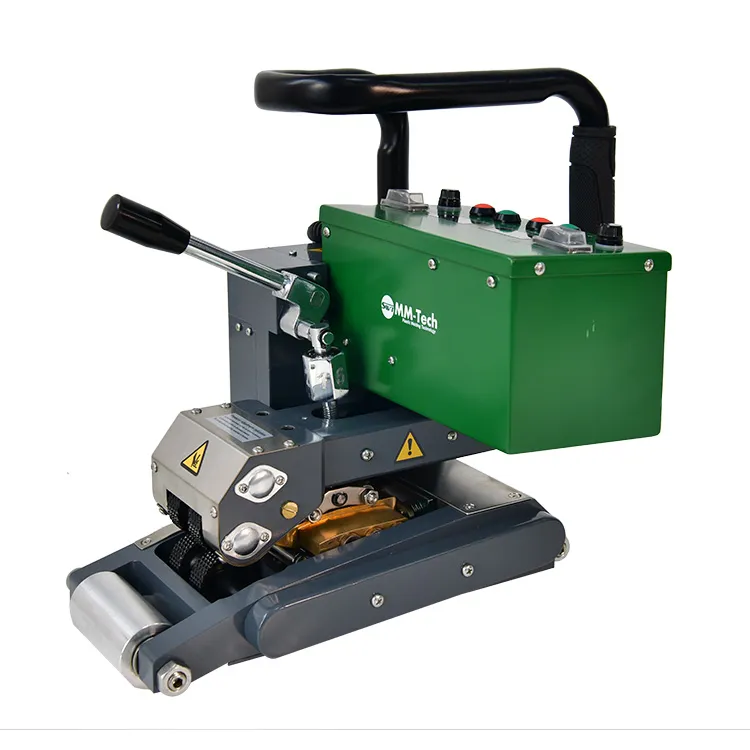
Vendor Comparison and Strategic Selection
When evaluating a wedge welder for sale, B2B buyers must consider not only the immediate purchase price but also the long-term total cost of ownership, including reliability, support, and technological advancement.
Key Comparison Factors:
| Feature/Criterion | High-Quality Wedge Welder (e.g., SWT-NS900D) | Standard/Entry-Level Wedge Welder |
|---|---|---|
| Temperature Control | PID closed-loop, digital display, +/-1°C accuracy | Analog knob, wider temperature fluctuation, +/-5°C |
| Motor & Drive System | High-torque DC motor, stepless speed adjustment, robust gearbox | Standard DC motor, limited speed steps, potentially less durable |
| Wedge Material | Premium copper alloy, rapid heat transfer, long lifespan | Basic steel, slower heating, faster wear |
| Chassis & Frame | Anodized aluminum, lightweight, high corrosion resistance | Steel, heavier, susceptible to rust without proper coating |
| Safety Features | Multiple protections (overheat, overload, E-stop), CE/UL compliance | Basic thermal cut-offs, fewer certifications |
| After-Sales Support | Extensive warranty, spare parts availability, technical training, quick response | Limited warranty, often slow or no spare parts, basic troubleshooting |
| Weight & Portability | Optimized for portability (~13kg for SWT-NS900D), ergonomic design | Heavier, bulkier, less user-friendly for field operations |
Choosing a reputable vendor, often with years of service and recognized certifications (e.g., ISO 9001, CE), ensures access to authoritative expertise, reliable products like the SWT-NS900D, and robust after-sales support. This holistic approach guarantees that the investment in a wedge welder contributes positively to project efficiency and longevity.
Customized Solutions and Application Case Studies
While standard wedge welder models like the SWT-NS900D meet most industrial requirements, specialized projects often demand customized solutions to address unique material properties, site conditions, or operational challenges.
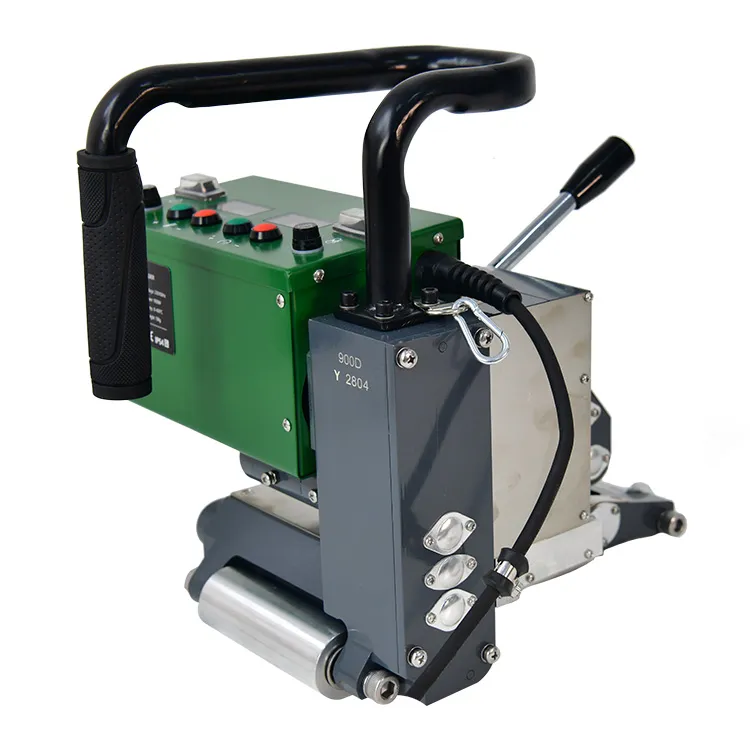
Customization Options:
- Specialized Wedge Geometries: For materials with unusual thickness or seam requirements, custom wedge profiles can be engineered to optimize heat distribution and pressure.
- Enhanced Roller Materials: For highly abrasive or chemically aggressive environments, rollers can be fabricated from specialized polymers or hardened steel for increased durability.
- Environmental Adaptations: Machines can be modified for extreme temperature operations (arctic or desert conditions) with specialized insulation, motor heaters, or cooling systems.
- Integrated Data Logging: Advanced units can be equipped with GPS and data logging capabilities to record welding parameters (temperature, speed, pressure) for quality assurance and regulatory compliance.
Application Case Study: Landfill Liner Installation
A major waste management firm undertaking a new cell construction for a municipal landfill required the installation of 1.5mm HDPE geomembranes across a 500,000 sq meter area. Traditional welding methods were proving too slow and inconsistent, leading to project delays and concerns over leak integrity.
Solution: The firm deployed a fleet of SWT-NS900D hot wedge welder machines. Their precise temperature control and high welding speed allowed for continuous, high-quality double-seam welding. The integrated test channel facilitated efficient air pressure testing of all seams on-site, providing immediate verification of weld integrity.
Outcome: The project was completed 20% ahead of schedule, with all welds passing stringent quality control tests. The client reported a significant reduction in labor costs and a higher confidence level in the long-term environmental containment provided by the geomembrane system. This demonstrated the efficiency and reliability that top-tier wedge welder for sale units offer in large-scale, critical applications.
Ensuring Trustworthiness: Support, Warranty, and FAQs
For B2B clients, the decision to invest in a wedge welder extends beyond product specifications to encompass comprehensive after-sales support and clear commitments.
Warranty and Support:
- Standard Warranty: Typically, a 12-month limited warranty covering manufacturing defects and workmanship is offered on new units like the SWT-NS900D. Extended warranty options may be available.
- Lead Time & Fulfillment: Standard models are usually available with a lead time of 7-14 business days, depending on inventory. Custom orders may require longer lead times. Efficient logistics ensure prompt delivery.
- Customer Support: Access to dedicated technical support specialists via phone, email, and live chat. On-site technical assistance or training can also be arranged.
- Spare Parts Availability: Comprehensive inventory of critical spare parts (wedges, rollers, heating elements) ensures minimal downtime and efficient repairs.
Frequently Asked Questions (FAQs):
Q: What materials can the SWT-NS900D weld?
A: It can effectively weld HDPE, LDPE, LLDPE, PVC, EVA, and PP geomembranes within the specified thickness range of 0.2 mm to 3.0 mm.
Q: How do I ensure weld quality?
A: The double-track weld with an internal air channel allows for non-destructive air pressure testing. Destructive peel and shear tests are also recommended for samples to verify weld strength.
Q: Is training provided for operating the wedge welder?
A: Comprehensive operational manuals are included. Many vendors also offer virtual or on-site training programs for operators and maintenance staff.
Q: What maintenance is required for a hot wedge welder?
A: Regular cleaning of the wedge and rollers, periodic inspection of electrical connections, and replacement of worn parts (e.g., carbon brushes for the motor, pressure rollers) as per manufacturer recommendations. This ensures a long service life.
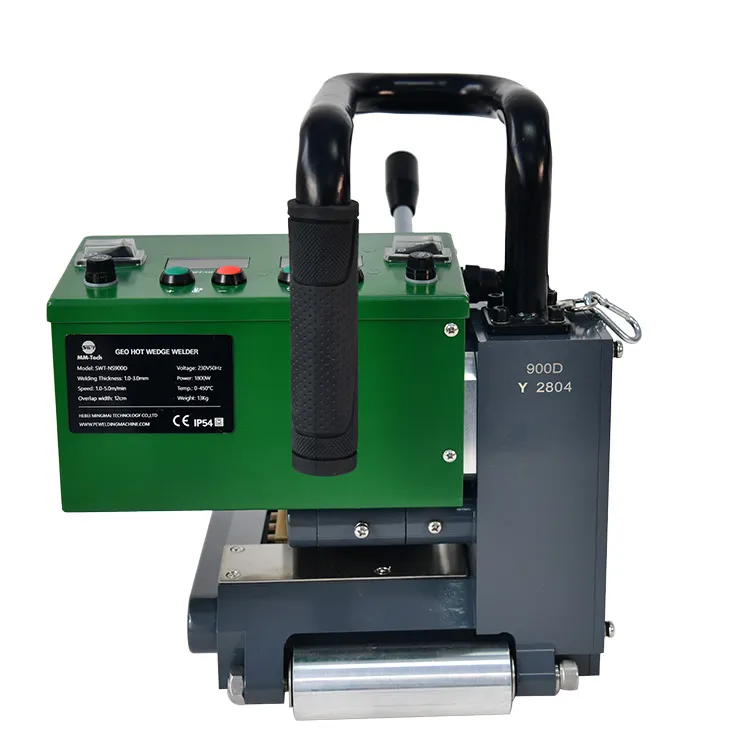
Conclusion: Investing in Reliable Geomembrane Welding Technology
The selection of a high-quality wedge welder for sale is a critical decision for any project involving geomembrane installation. As demonstrated by the SWT-NS900D Hot Wedge Machine, advanced technology, meticulous manufacturing processes, and comprehensive support systems converge to deliver superior performance, efficiency, and long-term reliability. By understanding the intricate technical specifications, diverse application scenarios, and the robust advantages of hot wedge welding, B2B decision-makers can make informed investments that underpin the success and environmental integrity of their critical infrastructure projects. The commitment to quality, backed by rigorous testing and adherence to international standards, ensures that these machines are not just tools, but strategic assets in modern industrial and environmental engineering.
References
- Koerner, R. M. (2012). Designing with Geosynthetics (6th ed.). Xlibris Corporation.
- ASTM International. (various standards). Standard Guide for Test Methods for Geomembranes.
- International Organization for Standardization (ISO). (various standards). Quality management systems.
- Geosynthetic Institute (GSI). (2023). Geosynthetics in Environmental Protection.
- Journal of Geotechnical and Geoenvironmental Engineering. (various issues). American Society of Civil Engineers (ASCE).
MM-Tech, established in 2011, is a leading manufacturer of thermoplastic welding equipment in China.hot air plastic welder We specialize in the research, development, production, and sales of thermoplastic welding equipment.hot air welding gun Our product line is extremely rich, covering geomembrane welders, polymer hot air welders, tarpaulin hot air welders, hot air welders, hand extrusion welders, and various welding tools, comprehensively meeting the diverse needs of both on-site construction and workshop operations.hot air welder roofing Our products have been exported to over 100 countries and have won the trust of more than 3,000 customers.plastic welding heat gun|super blog